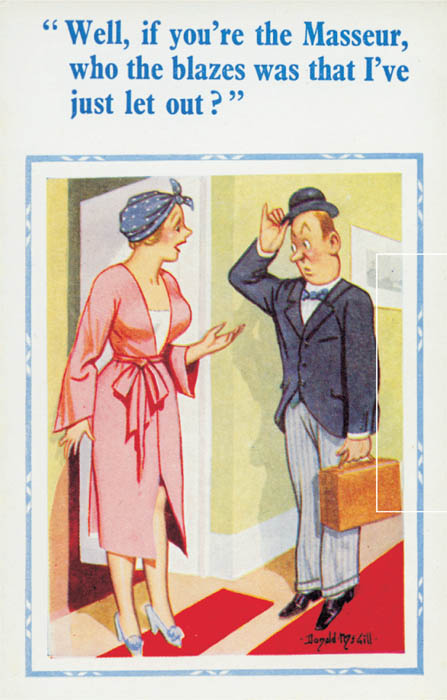
After the perceived repression of erotic art under the prudish Victorian intelligentsia, it took the Edwardians a while to let their hair down, and the man to help them do it was Donald McGill. Born in south-east London in 1875, McGill was a naval draughtsman who moved into postcards with the encouragement of an in-law who had seen a get-well card he had made for a sick nephew. A year later, McGill was drawing cartoons full time.
Between 1904 and 1962 McGill produced a staggering 12,000 postcard designs, coming up with six or seven new gags each week. Thankfully his father-in-law ran a music hall, which meant McGill had a constant source of new material.
The reserved Londoner’s postcards were available in stores across the country—in particular those in seaside towns—and soon became known as McGill’s Comics. Despite the misnomer, McGill did experiment with sequential storytelling in a series of six postcards in 1906, but the idea failed to grab the public’s imagination.
McGill’s distinctive color-washed drawings were ranked as “mild, medium, and strong” by the artist, according to their vulgarity, with “strong” being the best sellers. Despite his dubious career, his family remained steadfastly respectable, and said of his two daughters: “They ran like stags whenever they passed a comic postcard shop.”
When the First World War broke out McGill produced lots of humorous anti-German propaganda postcards, but the British government turned on him and puritanical censorship committees brought him to trial in Lincoln on July 15, 1954.
Author George Orwell was a huge fan of McGill’s and wrote an extensive essay on him, some 13 years earlier. “At least half of McGill’s postcards are sex jokes,” wrote Orwell, “and a proportion, perhaps ten per cent, are far more obscene than anything else that is now printed in England. Newsagents are occasionally prosecuted for selling them, and there would be many more prosecutions if the broadest jokes were not protected by double meanings…”
Sadly the double entendre defence didn’t stand up in court. McGill was found guilty under the Obscene Publications Act and forced to pay a £50 fine and £25 costs. The saucy postcard industry was dealt a devastating blow and many postcards were destroyed. Retailers cancelled orders and several companies went bankrupt. In the late 1950s the censorship eased off and the market slowly recovered, so much so that McGill gave evidence before a House Select Committee in 1957, set up to amend the flawed 1857 Act.
Yet despite their popularity (one of McGill’s postcards holds a world record for selling over 6 million copies), the artist earned no royalties from his designs, and when he died in 1962 his estate was valued at a mere £735. Today, McGill is regarded as a British national treasure, responsible for influencing everything from the British Carry On… movies to adult comics such as Viz.
A pair of classic Donald McGill postcards from some 12,000 images that the artist ranked as “mild, medium, or strong.”
This saucy French postcard by G Mouton (1906) is a very unsubtle allusion to oral sex. The caption reads “How they eat asparagus.”